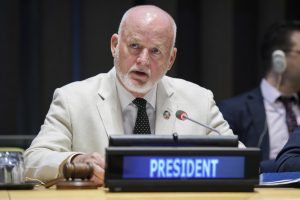As delivered
Closing remarks of Peter Thomson, President of the UN General Assembly, at high-level debate to observe the twenty-fifth anniversary of the assassination of Judge Giovanni Falcone
19 June 2017
Excellencies,
Ladies and Gentlemen,
Today’s high-level debate to mark the 25th anniversary of the assassination of Judge Giovanni Falcone has provided us with a timely opportunity for the international community to discuss ways to strengthen global implementation of the UN Convention against Transnational Organised Crime.
I would like to thank all the participants at today’s event, including Her Royal Highness, Honourable Ministers, distinguished panellists, Member States, civil society, and representatives of the United Nations system.
Throughout the day, a number of key messages arose from discussions.
All participants spoke of the bravery of Judge Falcone of his seminal influence on international crime prevention and criminal justice efforts, and of the ongoing work that must be pursued to ensure his legacy endures.
Today we have heard that achieving a world of peace and security, rule of law, human rights and sustainable development is fundamental to the Falcone vision. It is clear that lifting people out of poverty will help to safeguard our societies against the destructive influences of crime, corruption, and extremism.
During the first multi-stakeholder panel discussion this morning, speakers discussed the progress that has been achieved over the last 15 years in the implementation of the Palermo Convention.
Speakers highlighted the interlinkages between organized crime, terrorism and corruption, with instability, poor governance, and stagnant development outcomes.
They shared examples of how organised crime hinders sustainable development, and they reaffirmed the need for thorough implementation of the Convention and its additional Protocols. Speakers emphasized the importance of working further to identify shared criteria to form the basis for the Convention’s Revision Mechanism.
They emphasized the importance of addressing the root causes of organised crime, and of implementing the 2030 Agenda for Sustainable Development including, in particular Goal 16, which recognises the importance of addressing international crime, combating illicit flows and corruption, and promoting the rule of law to achieve just peaceful, and inclusive societies.
And they affirmed the importance of pursuing a comprehensive approach to combating organised crime, with the participation of all key stakeholders, including civil society and private sector.
During the second multi-stakeholder panel discussion on emerging gaps, trends and challenges in crime prevention and criminal justice, speakers noted the urgent need to further strengthen international and regional cooperation mechanisms to overcome the evolving global threat.
Speakers acknowledged that in addition to ‘traditional’ forms of organised crime, criminal groups are increasingly profiteering from emerging forms of organised crime, including cybercrime, wildlife and forest crimes, and trafficking in cultural property.
And with organised crime forming a large portion of the financing of terrorism, the need for shared global efforts to defeat transnational organized crime was highlighted, including through the use of creative and innovative approaches, and leveraging technological advances.
They also affirmed that if we are to achieve a peaceful and sustainable world for all – one where justice, good governance, and rule of law prevails – that we must be proactive in our approach to continuously strengthening our tools to fight organised crime.
Speakers called for all stakeholders to look for mutually-reinforcing opportunities to leverage global efforts to implement the 2030 Agenda for Sustainable Development to strengthen crime prevention and criminal justice efforts. This includes by strengthening law and judicial cooperation, promoting training and technical assistance, and providing necessary capacity-building for national authorities.
Excellencies, Ladies and Gentlemen,
During his life, Judge Falcone’s determination to rid regions of Italy of organised crime drew the attention and ire of his targets. But despite the ever-increasing deadly threats made against him, he would not be turned away from his pursuit of justice.
Let us therefore honour Judge Falcone’s sacrifice, and those of other victims of organised crime, by taking the examples and experiences that have been shared today back to our countries, and using them to strengthen our national and international frameworks in the fight against transnational organised crime.
To support this effort, in coming weeks my office will prepare a President’s summary of today’s discussion, which will be transmitted to the Conference of the Parties to the Convention and to all Member States.
It is my hope that today’s High-Level Debate will help drive the political will needed to strengthen the tools in our global armoury to combat organised crime by keeping pace with the challenges, innovation and technology of our fast-changing world.
I thank you.


